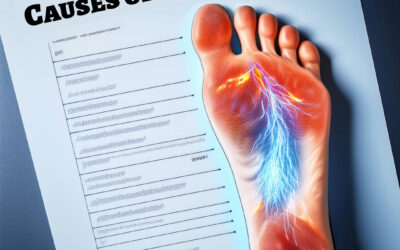Introduction to Neuropathy and its Impact on Daily Life
Neuropathy, often referred to as peripheral neuropathy, is a condition that results from damage to the nerves outside the brain and spinal cord. This damage can lead to a wide array of symptoms that significantly impact a patient’s daily life. Understanding these limitations can help individuals better manage their condition and seek appropriate treatments.
Top 10 Limitations Caused by Neuropathy
1. Difficulty with Balance and Coordination
Neuropathy often affects balance and coordination, making it challenging to walk or stand without the risk of falling. This limitation can severely restrict one’s ability to perform daily activities and maintain independence.
2. Numbness and Tingling in Extremities
Patients commonly experience numbness and tingling in their hands and feet. This can vary from mild discomfort to severe sensations that interfere with daily functions like gripping objects or walking.
3. Sensitivity to Touch and Temperature Changes
Many individuals with neuropathy have heightened sensitivity to touch and temperature changes. Simple tasks, such as holding a cup of coffee or stepping into a warm bath, can become painful experiences.
4. Muscle Weakness and Atrophy
Neuropathy can lead to muscle weakness and atrophy, particularly in the arms and legs. This can limit mobility and reduce the ability to perform physical tasks, from lifting groceries to climbing stairs.
5. Impaired Physical Activity and Mobility
Due to pain, weakness, and numbness, engaging in physical activities can become increasingly difficult. Over time, this can lead to a sedentary lifestyle, further exacerbating health issues.
6. Sleep Disturbances
Chronic pain and discomfort often interfere with sleep, leading to insomnia or poor-quality rest. This can result in fatigue, impacting one’s overall health and well-being.
7. Chronic Pain
Persistent pain is one of the most debilitating symptoms of neuropathy. This chronic pain can be sharp, burning, or throbbing, significantly affecting quality of life and mental health.
8. Challenges with Daily Tasks such as Writing and Buttoning
Fine motor skills can be impaired, making everyday tasks like writing, buttoning a shirt, or using utensils difficult. This can lead to frustration and a loss of independence.
9. Impact on Mental Health
The constant discomfort and lifestyle changes associated with neuropathy can lead to mental health issues such as depression and anxiety. The emotional strain of living with chronic pain should not be underestimated.
10. Complications with Wound Healing
Neuropathy can impair the body’s ability to heal wounds, particularly in the extremities. This can increase the risk of infections and lead to more serious complications if not properly managed.
Strategies to Manage and Overcome These Limitations
Physical Therapy and Exercise
Engaging in regular physical therapy and exercise can help maintain muscle strength, improve balance, and enhance overall mobility. Tailored exercises can also help mitigate pain and discomfort.
Medication and Pain Management Techniques
Various medications and pain management techniques, including topical treatments, oral medications, and nerve blocks, can help control neuropathic pain. It’s important to work with a healthcare provider to find the most effective regimen.
Assistive Devices and Home Modifications
Using assistive devices such as canes, walkers, or specialized footwear can improve mobility and safety. Additionally, home modifications like installing handrails and removing tripping hazards can make daily life more manageable.
Nutritional Support
Proper nutrition is essential for nerve health. A diet rich in vitamins B6 and B12, omega-3 fatty acids, and antioxidants can support nerve function and overall well-being.
Mental Health Counseling
Addressing the psychological impacts of neuropathy is crucial. Mental health counseling, support groups, and therapy can provide emotional support and coping strategies for living with chronic pain.
Conclusion and Resources for Further Information
Living with neuropathy presents numerous challenges, but understanding these limitations and actively seeking ways to manage them can vastly improve quality of life. For further information and support, consider reaching out to organizations such as the Peripheral Neuropathy Research Foundation or consult with a healthcare professional.
Finding Relief from Neuropathy Through Acupuncture
Neuropathy can be a debilitating condition, but there's hope in the ancient practice of...
Reclaim Your Life with Chiropractic Care for Neuropathy Relief
Neuropathy can be a debilitating condition, leaving many patients searching for effective relief....
Discover How Physical Therapists Are Redefining Neuropathy Treatment
Living with neuropathy can be a challenging and often painful experience. But did you know that...
Main Causes of Neuropathy
1. Diabetes One of the most common causes of neuropathy in the United States is diabetes. Diabetic...
Vibration Therapy and Neuropathy
How Vibration Therapy Can Help Neuropathy 1. Introduction to Neuropathy Neuropathy, a condition...
The Effects of Red Light LED Lights for Neuropathy: A Comprehensive Guide
Introduction to Neuropathy and its Symptoms Neuropathy, a condition resulting from damage to the...







